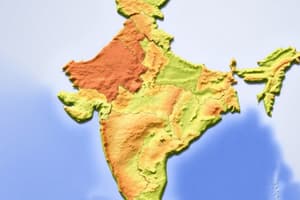Podcast
Questions and Answers
What role do mountains play in defining regional climates and ecosystems?
What role do mountains play in defining regional climates and ecosystems?
- They create deserts in surrounding areas
- They have no impact on regional climates or ecosystems
- They are responsible for ocean currents
- They block the movement of air masses, causing variations in temperature and precipitation (correct)
How do coastlines reflect the geological history of the land?
How do coastlines reflect the geological history of the land?
- By having a static nature with no changes over time
- By being devoid of any rocks or geological features
- By changing constantly due to natural phenomena like waves, tides, and storms (correct)
- By having a uniform appearance worldwide
What is the primary reason for the occurrence of earthquakes and volcanic eruptions according to plate tectonics theory?
What is the primary reason for the occurrence of earthquakes and volcanic eruptions according to plate tectonics theory?
- Changes in atmospheric pressure
- Meteor impacts on the earth's surface
- Movement of the earth's crust (correct)
- Human activities near fault lines
Why are bodies of water important for aquatic life?
Why are bodies of water important for aquatic life?
How do volcanoes significantly impact the local environment?
How do volcanoes significantly impact the local environment?
Flashcards are hidden until you start studying
Study Notes
Geography
Geography focuses on studying the location, characteristics, and distribution of physical and cultural features on our planet. It encompasses various aspects, ranging from the natural environment to human populations, their settlements, and economic activities. Herein, we delve deeper into the two main branches of geography: Physical Geography, which examines natural phenomena and landscapes, and Geographical Features, which are the tangible manifestations of geography, like mountains, bodies of water, and landforms.
Physical Geography
Physical Geography investigates Earth's physical attributes, including its structure, composition, and processes. It covers a wide array of topics:
Climate
Climate refers to the average weather patterns in a given area over a long period, usually measured over several decades. It varies due to latitude, altitude, ocean currents, and wind patterns.
Soils
Soil is the outer skin of the earth, providing essential nutrients and anchoring plants. Its formation depends on factors like parent material, relief, climate, organisms, and time.
Water
Water plays a crucial role in both natural environments and human societies. It exists in various forms, such as rivers, lakes, groundwater, snow, and ice caps.
Landforms
These are naturally occurring elevations and depressions on the surface of the earth. Examples include mountains, valleys, plateaus, islands, and cliffs.
Plate Tectonics
This theory explains the movement of the earth's crust, responsible for the creation and destruction of landmasses and the occurrence of earthquakes and volcanic eruptions.
Atmosphere
The atmosphere surrounds the earth and consists of gases, primarily nitrogen and oxygen, that affect weather, air pressure, and temperature.
Geographical Features
Geographical features are the visible, tangible aspects of geography. They include:
Mountains
Mountains are landform structures that reach above the surrounding terrain, often resulting from tectonic activity. They play a significant role in defining regional climates and ecosystems.
Volcanoes
Volcanoes are openings in the Earth's surface through which molten rock, ash, and gas escape. They can be found worldwide and significantly impact the local environment and human life.
Bodies of Water
This category includes oceans, seas, lakes, and rivers, which cover approximately 71% of the Earth's surface. They serve as habitats for aquatic life, sources of food, and routes for transportation.
Coastlines
Coastlines are the areas where land meets the body of water. They change constantly due to natural phenomena like waves, tides, and storms, and they also reflect the geological history of the land.
In summary, geography is a complex field that explores not only where things are located but also why they are present in those locations. It requires an interdisciplinary approach, combining knowledge from fields such as biology, chemistry, physics, anthropology, and sociology to gain a comprehensive understanding of our planet and its inhabitants.
Studying That Suits You
Use AI to generate personalized quizzes and flashcards to suit your learning preferences.




